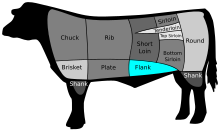Flank steak
 Cuts of beef | |
| Type | cut of beef |
|---|---|
| Part of a series on |
| Steak |
|---|
Flank steak is a cut of beef steak taken from the flank, which lies forward of the rear quarter of a cow, behind the plate. French butchers call it bavette, which means "bib". In Brazil, it is called fraldinha ("little diaper") and vazio ("empty") in Rio Grande do Sul. The cut is common in Colombia, where they call it sobrebarriga ("over the belly"); sobrebarriga a la brasa is a Colombian recipe for braised flank steak.[1] Argentina, Uruguay, and Spain call flank steak vacío ("empty").
Description[]

Flank steak is relatively long and flat cut, with significant graining. Flavorful but chewy, it is characteristically cut thinly on the bias for ease of consumption.
Use[]

Flank steak is used in a variety of dishes including London broil and as an alternative to the traditional skirt steak in fajitas. It can be grilled, pan-fried, broiled, or braised for increased tenderness. Grain (meat fibre) is very apparent in flank steaks, as it comes from a well-exercised part of the cow, and many chefs cut across the grain to make the meat more tender. It is frequently used in Asian cuisine, often sold in Chinese markets as "stir-fry beef", and is served in French cuisine as an at most medium-rare steak. Flank also serves as a common cut for steak jerky.
See also[]
 Food portal
Food portal- List of steak dishes
- Sirloin steak
- Ribeye steak
- Hanger steak
- Skirt steak
- Flap steak
References[]
- ^ Miller, Bryan (n.d.). "Sobrebarriga a la Brasa (Flank steak Colombian-style)". The New York Times. Retrieved 6 September 2021.
External links[]
 The dictionary definition of flank steak at Wiktionary
The dictionary definition of flank steak at Wiktionary
- Cuts of beef
- Mexican cuisine
- Meat stubs
- Mexican cuisine stubs

